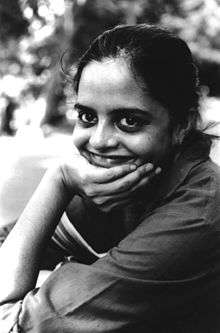Kalpana Kannabiran
Kalpana Kannabiran is an Indian sociologist and lawyer. She is the current Director of Council for Social Development, Hyderabad.[1] She is also a co-founder of the ASMITA Resource Centre for Women, a women's rights group.[2] She is a daughter of notable human rights activist, K. G. Kannabiran[3] and Vasantha Kannabiran, a feminist writer and a founding member of the women’s movement in India.
Kalpana Kannabiran | |
|---|---|
 | |
| Born | 1961` |
| Known for | Council for Social Development |
Career
Kalpana Kannabiran has a PhD in Sociology from Jawaharlal Nehru University and a Master of Laws (LLM) in Jurisprudence from Osmania University. She works in the field of women studies and legal aspects of discrimination.[1] She had combined research, pro-bono socio-legal counseling and rights advocacy in her work.[1]
She is a founding member of Asmita Resource Center for women set up in 1991. She was also the part of the founding faculty of NALSAR University of Law. In NALSAR she taught Sociology and Law for a decade (1999-2009)[4] and in June 2009, she resigned from her post at the Nalsar University of Law claiming that there was a North-South divide on the campus.[5] In October 2015, she was among the sociologists who signed a joint statement condemning the Dadri mob lynching, and the murders of M. M. Kalburgi, Narendra Dabholkar, and Govind Pansare.[6]
Awards and Achievements
In 2003 Kannabiran was awarded VKRV Rao Prize for Social Science Research in the field of Social Aspects of Law by the ICSSR.[4] She was also a member of the Expert Group on the Equal Opportunity Commission, Government of India from 2007-2008. She was also the General Secretary of Indian Association for Women's Studies from 1998-2000.[4] In the year 2013 Kalpana Kannabiran was awarded Amartya Sen Award for her work in the field of law.[7] She is currently the Director at the Council for Social Development, Southern Regional Center, Hyderabad. She is also the Member of the Executive Committee of the International Sociological Association.[1] She has also edited books like Women and Law: Critical Feminist Perspectives, Violence of Normal Times: Essays on Women's Lived Realities. She has also co-edited the book Challenging the Rule(s) of Law: Colonialism, Criminology and Human Rights in India.[8] Her most recent book is Tools of Justice: Non-Discrimination and the Indian Constitution.[8] In addition to this she has compiled and edited two successive NGO Alternative Reports on CEDAW for the National Alliance of Women-India.[1] She has Co-authored the book Muvalur Ramamirthal's Wob of Deceit: Devadasi Reform in Colonial India.[1]
See also
Further reading
- Editorials by Kalpana Kannabiran, The Hindu
- "All crimes are crimes against the state: Kalpana Kannabiran". Live Mint. 23 June 2014. Archived from the original on 23 June 2014.
References
- "Director". Council for Social Development. Retrieved 27 November 2015.
- "About Us". ASMITA Collective. Retrieved 27 November 2015.
- "Kannabiran, doyen of rights movement passes away". The Times of India. 31 December 2010. Retrieved 27 November 2015.
- "Kalpana Kannabiran". The Hindu. 26 January 2013. ISSN 0971-751X. Retrieved 25 November 2017.
- "Nalsar VC denies north-south divide". The Times of India. 29 June 2009. Retrieved 27 November 2015.
- "To Impose A Uniform Belief Or Practice Is Antithetical To Freedom". Outlook India. 17 October 2015. Retrieved 27 November 2015.
- "Six social scientists get first Amartya Sen awards - Indian Express". archive.indianexpress.com. Retrieved 25 November 2017.
- "Kannabiran, Kalpana | SAGE India". in.sagepub.com. Retrieved 25 November 2017.